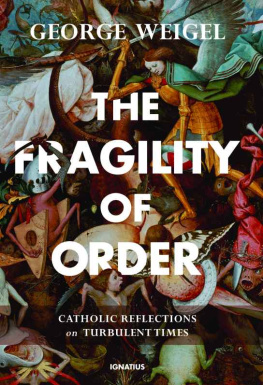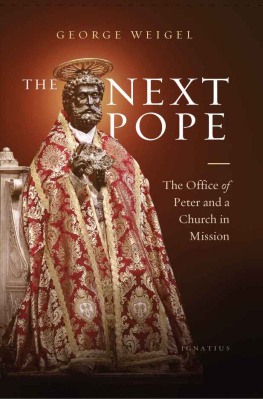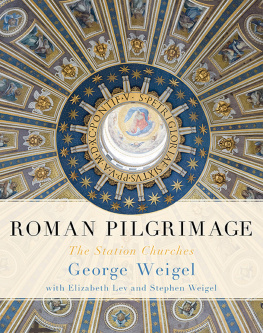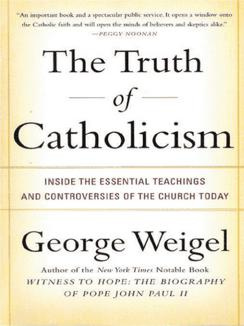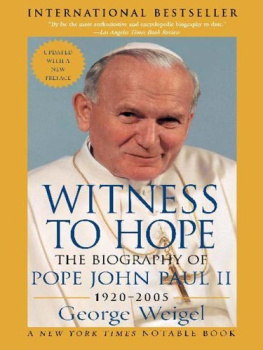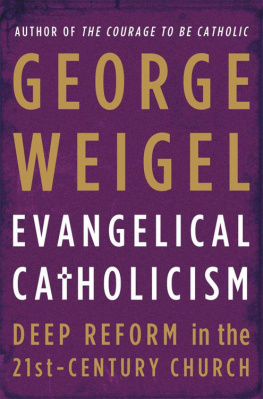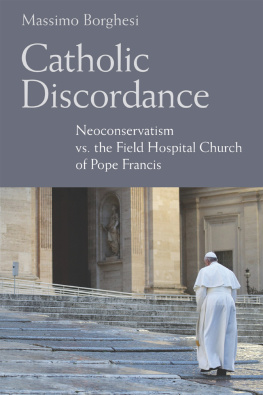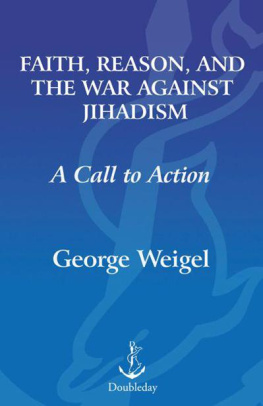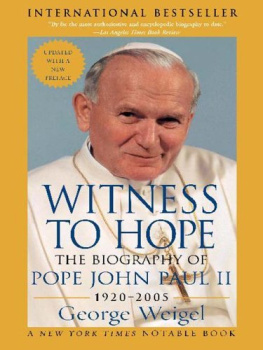THE FRAGILITY OF ORDER
GEORGE WEIGEL
The Fragility
of Order
Catholic Reflections on
Turbulent Times
IGNATIUS PRESS SAN FRANCISCO
Cover art:
Fall of the Rebel Angels
Pieter Bruegel the Elder, 1562
Cover design by John Herreid
2018 by George Weigel
All rights reserved
ISBN 978-1-62164-237-4 (PB)
ISBN 978-1-64229-035-6 (EB)
Library of Congress Control Number 2017956674
Printed in the United States of America
FOR
+ BORYS GUDZIAK
AND
+ ROBERT BARRON
CONTENTS
A World without Order
Why It Began, Why It Continued, and What That Means for Today
Ten Principles for Renewing the American Debate on Morality and Foreign Policy
Lessons from the Communist Assault on the Church
The Statecraft of a Saint
Benedict XVI on the Dilemma of Islam and Political Modernity
A Republic in Disarray
The Murray Template and American Political Culture
Belshazzar, Daniel, Leo XIII, and Us
Deep Truths and Public Policy
The Gregorian Option for American Cultural Reform
The Church in the Postmodern World
John Paul II and the Renovation of Christian Humanism
The Churchs German Problem, Africas Catholic Moment, and the Global Crisis of Marriage and the Family
What Happened, Why, and How
Learning from an Earlier Francis
INTRODUCTION
Things Coming Apart?
Not so long ago, Irish poet William Butler Yeats often-quoted lament about things falling apart and mere anarchy being loosed upon the world seemed rather exaggerated. Take the summer of 1991, for example.
On August 15, 1991, the Soviet Union disintegratedremarkably, on the liturgical feast of the Assumption of the Blessed Virgin Mary, celebrated the same day by both the Christian East and the Christian West. Two years earlier, during what history now knows as the Revolution of 1989, the Soviet external empire built by Lenin and Stalin self-liberated, led by Poland. Between 1989 and 1991, independence movements in the Baltic states, led by Lithuania, began dismantling the Union of Soviet Socialist Republics: Lenins and Stalins internal empire. The coup de grce for the entire Soviet enterprise, arguably the greatest tyranny in human history, came when a hardline revolt against Soviet president Mikhail Gorbachev failed and the republics of the Soviet Union one by one detached themselves from the USSRs Russian core.
And at that point, the Great Emergency ended: the civilizational crisis that began in 1914 and threatened to destroy the West (and, in its latter phases, the entire world) seemed to have been resolved in favor of the forces of freedom. Imperfect democracies had defeated a pluperfect tyranny; a third wave of democratization seemed poised to sweep the globe; free economies, unshackled from socialist-bureaucratic control, would liberate the world from gross poverty and deliver unprecedented wealth; new forms of international and transnational political organization, linking free societies in a thick network of collaborative efforts, would replace the old power games of world politics; peace with honor, which British prime minister Neville Chamberlain so vainly proclaimed in 1938, was at hand.
As for the United States, the blood and treasure it had invested in the Cold War seemed vindicated. America was the dynamo of world-historical initiative. Deft American diplomacy led to the reunification of Germany and the creation of what looked to be a permanently stable, peaceful, and wealthy Europe. More creative diplomacy produced a major drawdown of nuclear weapons. A prominent intellectual proclaimed it the end of history, and the American people imagined that they could begin to enjoy a long-sought peace dividend, even as their high-tech military proved itself capable of maintaining the rudiments of a new world order in the First Gulf War.
While the world seemed on the brink of a new era of peace and prosperity, the Catholic Churchthe worlds largest religious body, which had proven itself a powerful agent of liberation in the Revolution of 1989seemed ready to provide this post-Cold War world with a compelling moral compass, even as it felt itself reenergized for its primary mission: the conversion of the world.
A brilliant pope, John Paul II, had ignited the revolution of conscience that made the nonviolent, political Revolution of 1989 possible. On May 1, 1991, he issued a striking encyclical, Centesimus Annus . Originally conceived as a centennial commemoration of Pope Leo XIIIs seminal 1891 social encyclical, Rerum Novarum , the stirring events in Europe throughout the 1980s led John Paul II to write Centesimus Annus as a prescription for the futurea future of freedom in which democratic politics and market-centered economies, guided by law and tempered by a vibrant public moral culture, would shape the human future in ways consonant with the inalienable dignity and value of every human being. Four years later, John Paul put that vision before the General Assembly of the United Nations, boldly claiming that the tears of [the twentieth] century [had] prepared the ground for a new springtime of the human spirit.
And the Church would contribute to that springtime by recovering its original self-understanding as a communion of missionary disciples. Thus, shortly before Centesimus Annus , on December 7, 1990, John Paul II issued another landmark encyclical, Redemptoris Missio (The Mission of the Redeemer). There, he taught that the Church did not have a mission, as if mission were one of a dozen things the Church did; rather, the Church is a mission, and everyone in the Church is a missionary, commissioned by baptism to help spread the Gospel throughout the world. Shortly afterward, John Paul began using the term the New Evangelization to express this contemporary recovery of the Churchs original purpose. Then, in drawing the Great Jubilee of 2000 to a close, the Pope challenged the entire Catholic world to leave the shallow waters of institutional maintenance and put out into the deep for a great catch of souls, following the Lords injunction in Luke 5:4 that led to the miraculous draught of fish.
A world poised to achieve all the great things imagined before World War I because order had been restored to global affairs after the seventy-seven years of the Great Emergency; an America imagining itself returned to the natural order of things, at peace with the world and beginning to feel the expansive economic effects of the IT revolution; a Church eager to offer humanity the healing truth of the Gospel and to make its unique contribution to building free and virtuous societies, because it had rediscovered its own order and purposeit was a heady time indeed.
A quarter-century later, things look rather different. In fact, on the edge of the third decade of the twenty-first century and the third millennium, Yeats premonition of things coming unraveled seems increasingly prescientin the world, in the American republic, and in the Church. And to continue to borrow images from the Irish poet, it is not at all certain what the many rude beasts slouching toward Bethlehem portend about the future of Catholicism, America, or the world. Order, it has become clear, is a very fragile thing; and order is especially vulnerable under the cultural conditions of a postmodern world unsure about its grasp on the truth of anything. Order is not self-maintaining. Order is an achievement, and it must be attained, over and again.
This is perhaps most obvious in terms of world affairs. If peace, as Saint Augustine taught, is the tranquillity of order, the orderdividend that might have been expected at the end of the Cold War turned out to be something of a chimera. The unfinished business of the First Gulf War was followed by the lethal crack-up of Yugoslavia, which was followed by largely ignored signals that jihadist Islam had the West, and particularly the United States, in its apocalyptic crosshairsa fact that became unmistakably clear on September 11, 2001. That cataclysmic event led to wars in Afghanistan and Iraq, a debilitating world-weariness on the part of the American people, the reassertion of Russian power by a virtual dictator who never got the memo that the Cold War was over, a newly aggressive China flexing its muscles throughout East Asia, and so forth and so on, in a litany of disorder that seemed inconceivable in 1991and that seemed ominously intractable a quarter-century later.
Next page
